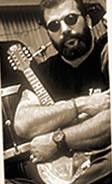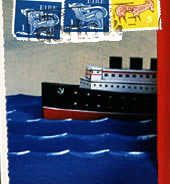 |
 |
 |
|||||
A CONVERSATION WITH STEVE EARLE
[The tape opens up with laughing, I can't remember what at, but we did a lot of that.]
Puremusic: You're one of the busier, more spread out singer songwriters that can be found anywhere. What are you up to lately?
Steve Earle: God, let's see. Since the tour ended, which is about two months ago, finally -- it was long, a year and a half...I walked into this theater company we started with both feet, it just worked out that way. Our first show went up in September, and Sara was in that show. Which meant that I mainly chased kids for a lot of the time that that was going up. Then I saw all 18 performances, which I swore I wasn't going to do. But I did, staying every night and seeing every show.
I was working as a producer on that show. Then we went almost immediately into The Vampire Monologues, Jeremy Childs' show, which had to go up straight away for Halloween, marketing-wise. So we ended up doing two shows back to back right at the top, Mud in September and The Vampire Monologues in October.
PM: Who wrote Mud?
SE: Mud is by Maria Irene Fornes, who is a Cuban American playwright. She was in New York around the same time that Sam Shepard was, before Shepard went to London, that original downtown, off-off Broadway movement. She's won eight Obies, and Mud was one of them. She's actually becoming one of my favorite writers. I knew about her, but I didn't really know her work until one of the people involved in the company brought this play in, and we all read it and fell in love with it.
The Vampire Monologues was written by Jeremy Childs, who's a writer and actor here in Nashville, one of our best local actors. Last year, another theater company had it, and we just upgraded it a little bit. I was in it, which was sort of an accident, you won't see me doing a lot of that. But it was fun, and because I had a schedule to keep, we were only up two weekends. The morning after it closed I flew to London and did three shows with my son and sister, we've been doing that occasionally.
PM: Just the threesome, or with a band?
SE: It's just the three of us. All of us playing separately, and then doing some things together. It's kind of "An Evening With..." and it's kinda cool. Then I went out to Wales because Marah, one of the bands on E-Squared [Earle's record company] was making their second album at Rockfield, and I wanted to check and see how that was going.
PM: What are they about, Marah?
SE: They're a rock band, from Philadelphia.
PM: Let's have a few words about Ireland, and your writing experience there.
SE: Well, you know, the greatest poets in the English language are nearly all Irish.
PM: We make poor physicists, but excellent bards.
SE: Yeah, I don't know any Irish physicists...but I think poetry is in the rocks of Ireland. It's a very literary country. There's a strong oral tradition there, and I think that's part of it. They're the greatest poets in the English language, and it's not even their language, they had it shoved down their throats and mastered it. It's a very musical place, and I've always loved it. We've always done very well there, it's always sort of liked us, so it makes it easy to like a place. Then I fell in love with Galway, on the West Coast. Galway's a college town, and has all that, a town that artists have been living in the margins of for many years.
PM: The coolest town, they say.
SE: Yeah, every dog has a bandana around its neck and a frisbee in its mouth, the correct number of espresso machines per capita, a lot of girls, it's a great place.
PM: How is Doghouse Roses going over? [Steve's recent book of short stories, see our review.]
SE: It's done really well. Most of the reviews have been good. The couple of writers that have really hated it probably have stacks of unpublished manuscripts sitting at home. That's one of the things that happen when you write. And some of the reviews that haven't been totally positive have been constructive. Imagine that, it's a rare occurrence nowadays.
PM: Did you take anything away that you remember from any of the negative reviews?
SE: I don't usually read reviews. I read more reviews of the book than I'd read record reviews for many years. But I don't take anything away from it. No review is ever going to affect whether I'm going to do something, or how I'm going to do it. I think the criticism that I take to heart is from other writers that I respect. continue
print (PDF) listen archives puremusic home